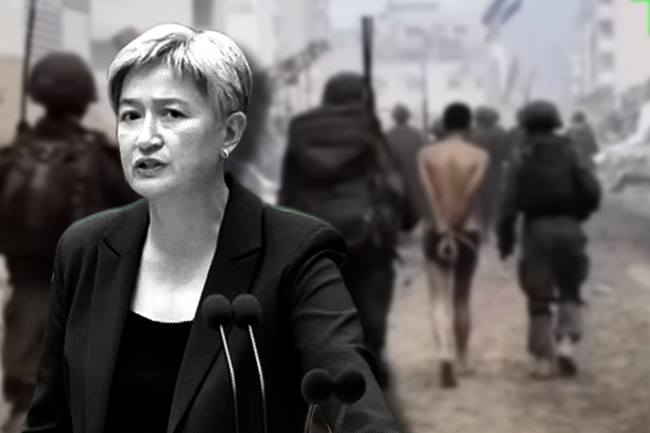Since MPs are responsible for legislation that intrudes into Australian bedrooms, their behaviour, at a time when sexual exploitation is also under global scrutiny, is definitely a matter of public interest, says Dr Jennifer Wilson.
THE STRONG inference in this piece, 'Barnaby Joyce battles vicious innuendo as Coalition fears citizenship woe', published in the Daily Telegraph on Saturday, is that Deputy Prime Minister Barnaby Joyce conducted an illicit affair with a staffer in his office that has led to upheaval in his marriage and discontent in his workplace.
The salacious details of Joyce’s extra-marital activities are of less relevance to the public than the interesting reactions from some press gallery journalists to the outing of Joyce’s “private life”.
It is not in the public interest; there is a convention that political private lives are left unexamined – that is, some are left unexamined, others are torn to shreds, so at the very least the application of the convention is highly selective – and what politicians do in their private lives is nobody’s business but their own. So are some of the observations made by those journalists who have, to my mind inexplicably, taken offence at the outing of Joyce.
There are several aspects of this situation that are worthy of consideration. All of them make Joyce’s personal life choices matters of public interest and the fact that they all seem to have escaped the notice of some of the Press Gallery is both astounding and concerning.
Affairs between bosses and employees
It could be argued that these affairs never occur between equals; the power imbalance between, say, a deputy prime minister and his staffer being such that the equality necessary for consent is absent. What is interesting is that journalists who freely discuss similar situations in other workplaces oppose exposing Barnaby and politicians in general. Why, one wonders, is the Parliament House workplace exempt from scrutiny? It’s naïve to imagine the Australian political workplace is free from sexual shenanigans, so why is it afforded special protection by Press Gallery journalists?
I don’t recall journalists refraining from publishing details of the affair between Tim Worner of Seven West Media and his employee Amber Harrison. Nobody was overly concerned about protecting either party’s privacy in this boss and employee imbroglio. Yet for reasons that are difficult to understand, such protections are assumed by “convention” to be the politician’s right. Privacy would appear to be a somewhat fluid concept, used by some journalists to withhold important information from the voting public.
This bias is, without doubt, a matter of public interest.
Heterosexual marriage is the sacred foundation of society
Joyce is an ardent "No" voter in the current marriage equality opinion poll.
He has even bizarrely claimed that marriage equality will, in some as yet undefined manner, deny his four daughters their inalienable right to a heterosexual marriage:
We know that the best protection for those girls is that they get themselves into a secure relationship with a loving husband, and I want that to happen for them.
I don't want any legislator to take that right away from me.
Joyce used his four daughters’ inalienable right to heterosexual marriage as an argument against marriage equality. This in itself makes no sense, but it does demonstrate his hypocrisy in advocating a “secure relationship with a loving husband” as a woman’s ultimate “protection”. I doubt his wife or his daughters feel particularly protected by the man who has brought such unwelcome attention to their lives through his own alleged infidelity.
Unfortunately, heterosexuality is no guarantee of fidelity, as Joyce has allegedly demonstrated. He has failed to provide for his wife and daughters that which he insists not he, but marriage equality will deny them. Joyce is the Deputy and, sometimes, Acting Prime Minister of Australia. He is a public figure of considerable influence. He appears to be shifting responsibility for the fouling of heterosexual marriage onto LGBTQI people, while himself, it seems, betraying his family and what he perceives to be the sacred foundation of society.
This is a matter of public interest. How could any good journalist consider it otherwise?
The Weinstein effect
As has been most recently demonstrated by the speaking out of innumerable Hollywood actresses sexually assaulted by powerful film mogul Harvey Weinstein, the only way men can continue predatory sexual behaviour is through their dependence on the silence of others. In principle, every journalist who knows of the predatory sexual behaviour of politicians (and seeking a sexual affair with your employee is predatory behaviour, given the power imbalance) is enabling that behaviour.
The “private lives” argument is, quite frankly, bullshit, and used to justify a cowardly silence. Once a politician embarks on an illicit affair with an employee, he or she no longer has the right to a private life. It is a relationship of such inequality that questions must arise, and must be addressed as to the consensuality of the engagement and who will most likely bear the often drastic consequences when the affair is discovered/ended?
Politicians should be left alone to sexually exploit subordinates and nobody should call them to account? This is exactly how Weinsteins happen.
That many journalists fail to see this, given the current climate, is alarming. Not only is the politician’s behaviour a matter of public interest, so, in this instance, is the journalist’s.
An MP’s private life is not sacrosanct. Indeed, as they are responsible for legislation that all too frequently intrudes into the bedrooms of Australian citizens, they are even more accountable to the public than CEOs whose philandering temporarily affects share prices.
What the Joyce affair has immediately brought to our attention is the willingness of some Press Gallery journalists to continue to protect MPs at a time when sexual behaviour in the workplace – and the appalling sexual exploitation of employees by the powerful – is under intense global scrutiny. In all workplaces, it would seem, except the Australian Parliament.
This exemption for MPs – this exceptionalism – ought in itself to be a matter of grave public concern. And one can only wonder what else do some journalists decide it is not in our interests to know — and why?
You can follow Jennifer Wilson on her blog No Place for Sheep or on Twitter @NoPlaceForSheep.

This work is licensed under a Creative Commons Attribution-NonCommercial-NoDerivs 3.0 Australia License
Monthly Donation
Single Donation
Stay in touch. Subscribe to IA for just $5.











